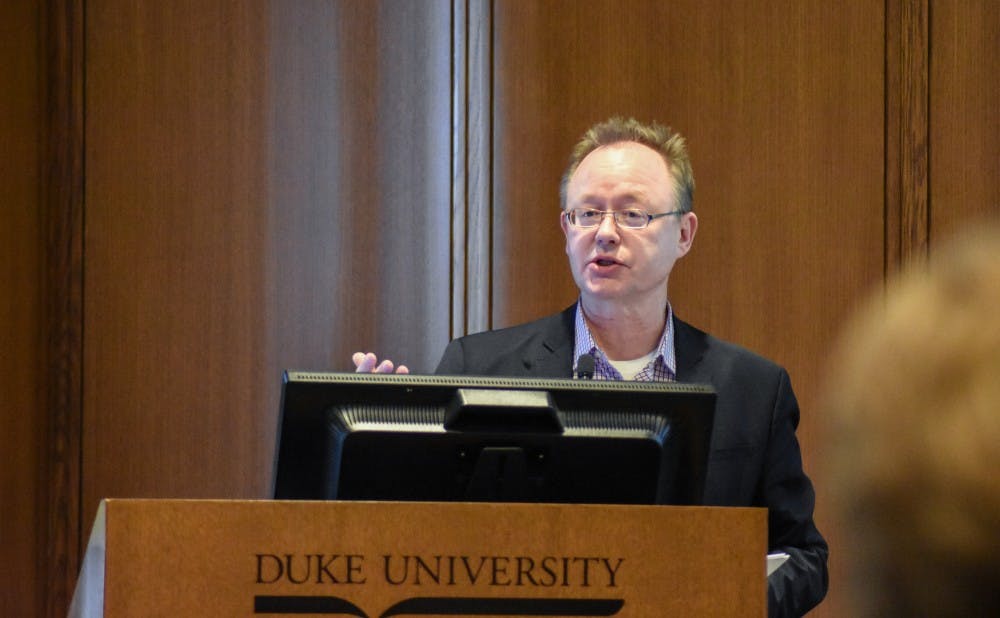Jewish individuals living under the Nazi regime during the Holocaust didn't just passively suffer—some resisted, a prominent Holocaust historian said during a talk Thursday.
Most historians have focused on either Nazis or Jews or organized armed resistance to the fascist regime, but they have a blind spot in terms of individual acts of resistance, said Wolf Gruner, founding director of University of Southern California Shoah Foundation Center for Advanced Genocide Research.
“Our understanding of the Holocaust has been eclipsed by the post-war discussion of the collaboration [in resistance] that we have ignored how hard the Jews tried to do something with the limitations [they faced at that time],” said Gruner, who is also a professor of history at the University of Southern California.
Speaking at an event co-sponsored by the department of art, art history and visual studies and the history department, he noted that individual resistance has been under-researched. But why?
Scholars who study the Holocaust primarily rely on the reports by the state authorities and diaries or memoirs by individuals as their sources. State authorities were generally unwilling to acknowledge the existence of Jewish resistance against their rule, leaving very limited records of individual resistance, Gruner said.
On the other hand, he explained individuals might be hesitant to include evidence of individual resistance in diaries for fear of punishment if discovered.
Gruner said he started to notice individual Jewish defiance against the Nazis when he looked through police logbooks from a Berlin police precinct during his research for a previous book. The logbook recorded cases of arresting Jews due to their public protests against Nazis’ anti-Jewish measurements, he noted.
“By that time, I had already done more than 20 years of research on the Holocaust and I have never heard or read about [such protests],” Gruner said. “How is this possible?”
In his recent research, Gruner examined police logbooks from the police precincts across Nazi German territory, from Berlin to Vienna. He found numerous cases in all areas and a variety of defiance, including deliberate damage of Nazi symbols and posters, open challenge of restrictions and even physical resistance.
For instance, Gruner found in one of the archives that a merchant scratched a swastika sign on a public bus with his walking cane in Hamberg in 1936 to degrade the Nazi regime and received a five-week sentence, he said.
As a part of the visual archives project at the Shoah Foundation Center, Gruner has also conducted a series of interviews with Holocaust survivors, which uncovered instances of physical self-defense by the Jews.
In one of the interviews, Diane Jacobs, a Jewish survivor who was about 15 years old when the Holocaust started, described how she fought back the Nazi soldiers when she was at a Nazi retraining camp, but was immediately arrested. Despite the repercussions, she physically confronted the Nazi armies three times before she escaped to England just before World War II started.
Gruner explained that as second-class citizens in Germany, Jews had extremely limited means to defend themselves, rendering every act of individual defiance significant.
“Some Jews resist once but because the repercussions are tremendous, they often shy away from another [defiance],” he said.
Gruner added the number of individual Jewish defiances against the Nazi rule may be much larger than indicated by his research because he has only studied the cases that are recorded by the police while many more escaped detection.
Studying the archives also enabled him to appreciate the complex nature of the Holocaust. There were non-Jewish Germans who stood up against anti-Jewish measurements and instances when judges acquit Jewish suspects out of empathy, Gruner said. But there were also cases when non-Nazi Germans were also involved in the discrimination against the Jews.
Jessica Williams, a junior who attended the talk, said she felt Gruner’s research was valuable because it brought a new perspective to the study of the Holocaust.
“There is so much information in resources and archives that have not been explored,” she said. “Professor Gruner’s research did a great job uncovering it.”
Get The Chronicle straight to your inbox
Signup for our weekly newsletter. Cancel at any time.

